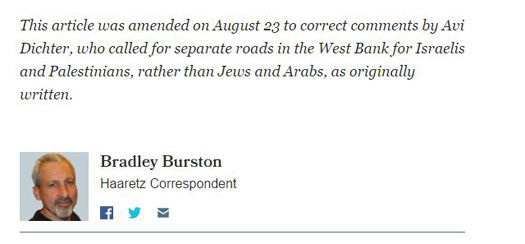In a column last week liked over 44,000 times on Facebook, Haaretz columnist and senior editor Bradley Burston relied, in part, on an oft-repeated falsehood about separate West Bank roads “for Jews and Arabs” to argue: “Our Israel is what it has become: Apartheid” (“It’s Time to Admit It: Israeli Policy Is What It is: Apartheid,” Aug. 17.)
“Apartheid means Likud lawmaker and former Shin Bet chief Avi Dichter calling Sunday for separate, segregated roads and highways for Jews and Arabs in the West Bank,” Burston alleged, helpfully providing a link to a Times of Israel article on Dichter’s statement.
The Times of Israel article does not, in fact, support Burston’s claim that Dichter called for separate roads “for Jews and Arabs in the West Bank.”
To the contrary, the Times of Israel article clearly states that Dichter called for separation between Israelis and Palestinians, not Jews and Arabs. The Times of Israel article states:
Likud MK Avi Dichter said that separating Israeli and Palestinian drivers on West Bank highways was an inevitable move. . . .Segregating roads, he declared, would ensure that Palestinian vehicles wouldn’t be able to enter Israeli settlements and Israel vehicles wouldn’t be able to enter Palestinian cities or villages.
False claims about Israeli policies (proposed or ostensibly actual) of separate roads for Arabs and Jews have long bolstered the “Israel as apartheid” canard (repeated most recently by Burston). While there are some West Bank roads that are restricted only to Israelis or only to Palestinians, there are no Israeli-controlled West Bank roads restricted only for Jews or only for Arabs.
The distinction is substantive given that some 20 percent of Israel’s citizens are not Jewish. West Bank roads from which Palestinians are prohibited are open to Israeli Arabs and other non-Jewish Israelis. Dichter’s call was for more separate roads for Palestinians and Israelis, not for Arabs and Jews.
Thus, just like the Israeli law granting automatic governmental financial compensation to all Israeli victims of terror (Jews and Arabs alike), which Burston also cites as supposed evidence of apartheid, Dichter’s proposal was based on nationality, and not race or ethnicity.
Haaretz has previously been entangled on the “Jewish-only apartheid roads” falsehood, falsely alleging separate roads for Jews and Arabs, back in 2010, 2009 and 2005.
Similar erroneous reporting has been previously corrected by The Boston Globe, the Associated Press, Washington Post, CNN and others.
In response to communication from CAMERA’s Israel office, Haaretz editors commendably set the record straight, making clear that Dichter called for a separation of Israelis and Palestinians on West Bank roads, and not a separation of Jews and Arabs, as Burston initially reported.
As of this writing, the amended article accurately states:

In addition, editors commendably appended the following note alerting readers to the correction:

In a BBC World Service interview about Burston’s piece, longtime anti-apartheid activist Benjamin Pogrund, along with Ran Bar Yoshafat of the Israeli Jewish Congress, expertly demolish Burston’s recycled apartheid fallacy.
For more Haaretz corrections prompted by CAMERA and its Hebrew Web site Presspectiva, please see here.
